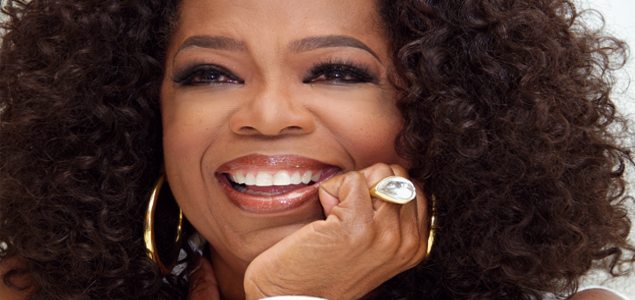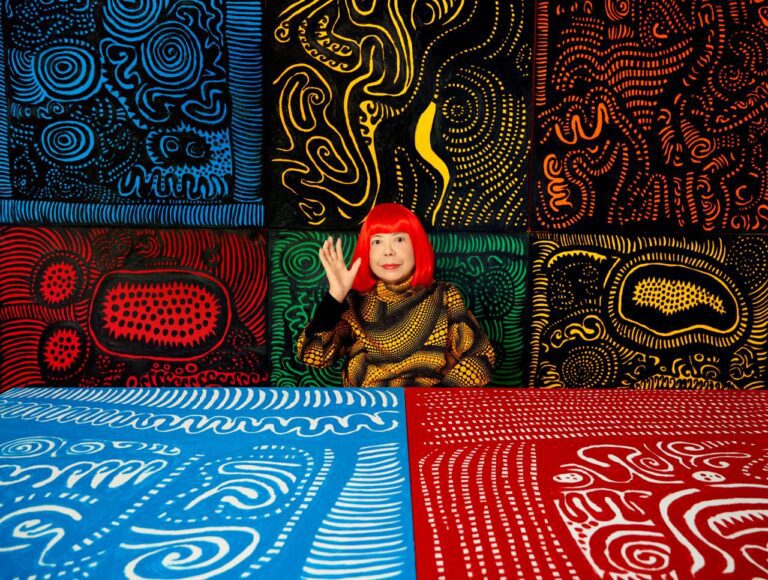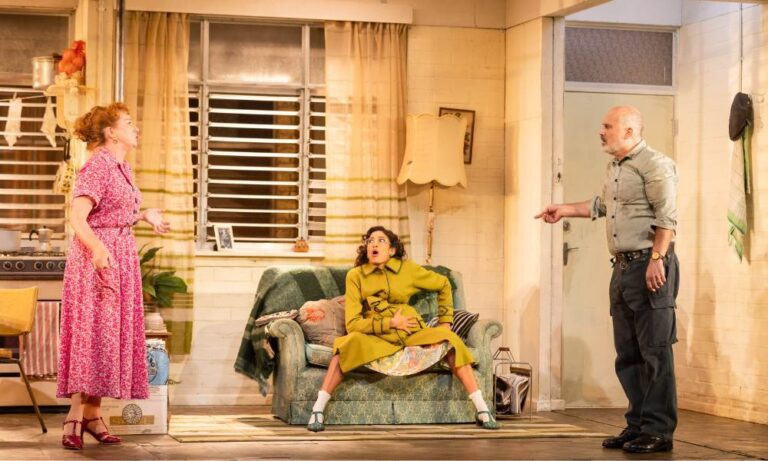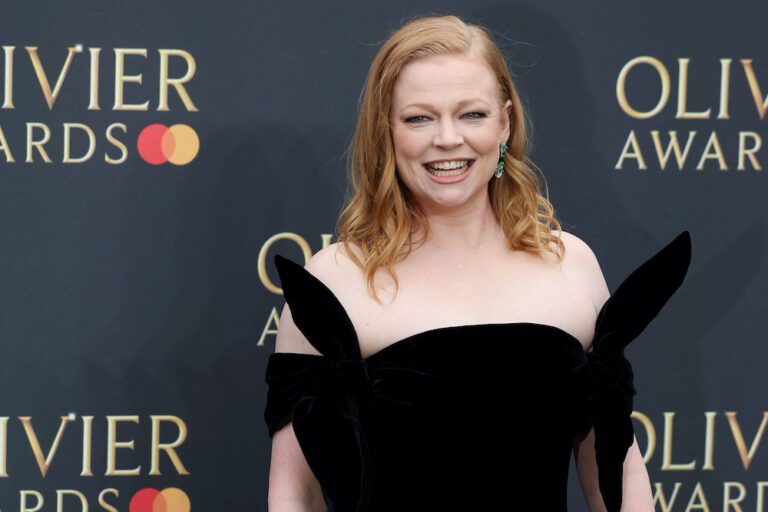Talk show titan and superstar Oprah Winfrey is a veritable powerhouse, a trailblazer in many senses of the word. Founder of O magazine, CEO of the Oprah Winfrey Network, avid philanthropist and actor, she has touched millions of lives worldwide.
The unmistakable boom of her voice can be heard a corridor’s length away. It’s apparent she’s on the phone, winding down a conversation. Her tone is relaxed and upbeat and as that familiar laugh draws nearer, finally, like a magic illusion, Oprah Winfrey appears in the doorway.
Rather than merely entering a room, she makes an entrance. In fact, the manner in which she strides into the ballroom of the Four Seasons Hotel, is as if a rousing applause wouldn’t be entirely inappropriate or even unexpected on my part.
It’s an odd power dynamic, sitting opposite a veteran interviewer we’ve watched make an endless string of diverse interview subjects feel comfortable for more than two decades. Today the set-up is no different, except she’s not in the driver’s seat – or so she lets me think. Ever the pro, she manages to convey a sense of enthusiasm even though it’s day four on the promotional trail for her upcoming movie, Lee Daniels’ The Butler.
“It’s funny but being on the other side of the microphone for many years, I know how terrifying it can be, so I try to make it a point to make each interview I do for the movie as interesting as I can,” she says. Presumably, being an interviewee might not be one of Winfrey’s favourite activities? “Oh, this is one of my faaaavourite things,” she laughs, and rises from her seat to bring two bottles of Evian water back to the table.
A sort of one-woman chameleon, Winfrey has appeared with so many different looks, even body shapes, over the years, I’m unsure what to expect. Today she’s decided to go for big hair with curls and her outfit is composed of a white long-sleeved top with cutouts on the shoulders and white trousers. She looks to be in good shape.
Star production
Despite her friendliness, there’s a no-nonsense air about her and we proceed to discuss the movie at hand. An historical drama loosely based on the real life of a White House servant’s 34-year tenure covering eight presidential administrations, it is set against the racially charged civil rights movement in America.
Forest Whitaker plays the titular role, Oprah his heavy-drinking wife with an eye for the next door neighbour (Terrence Howard). The cast also includes Vanessa Redgrave, Liev Schreiber and Cuba Gooding Jr. Did Winfrey feel she had to put them at ease? And how does a mononymous icon do ensemble anyway? She laughs loudly.
“You mean, how do I remove the Oprah-ness?” She pauses. “Well, that was one of my fears. The more known I became in the culture as myself, it was harder to take on a film, particularly a modern film, so it’s easier to do something period, like this. But I work to try to surrender myself and all my Oprah-ness to who I believed I could be as this woman.”
Much has been made of her so-called “near-breakdown” during the shoot. She explains that it was simply a matter of being overworked and overwrought. “When Lee [Daniels] asked me to do this role, it couldn’t have come at a worse time. I was going through … creating a television network, I was being flamed in the press, and I was trying to pull a team together to make the network.
“So, literally, I would go shoot a scene and then get on the phone with my team about OWN [the Oprah Winfrey Network]. It was just the way my life worked out. When I choose something I need it to fill me up and not drain me.”
The very mention of her name evokes many and varied reactions. But regardless of public opinion, there are the undisputed facts: she is a 59-year-old woman from rural Mississippi born into poverty to a teenage single mother. She was raped at age 9 and became pregnant at 14; her son died shortly after. Her career would begin at age 17 when she won the Miss Black Tennessee beauty pageant. She was then offered an on-air job at a radio station serving the African American community in Nashville. After winning a scholarship at Tennessee State University, she signed on with a local television station as a reporter and anchor.
Several local assignments led to her establishing famed The Oprah Winfrey Show. She’s also tried her hand at acting, earning a Best Supporting Actress Academy Award nomination for her film debut in 1985’s The Color Purple. She has donated millions to various causes including Hurricane Katrina and the Smithsonian National Museum of African American History and Culture. She has also invested around US$100 million in the Oprah Winfrey Leadership Academy for Girls near Johannesburg, South Africa.
Dreaming big
Considering her career, could she have ever imagined a life as a
stay-at-home wife perhaps, like the woman she plays in The Butler?
“First of all, a stay-at-home wife is something that would never, ever occur to me. I always thought I was going to somehow be allowed to speak to the world. I didn’t know if I was going to be a preacher with my own church, or be a teacher, but it would be something like that,” says Winfrey.
“But also, I was lucky enough to have been born in 1954, the year Brown v. Board of Education happened [the US Supreme Court ruling that racial segregation in public schools was unconstitutional]. Prior to that era, women who had their own dreams, who wanted to make more than a sandwich and watch soap operas, women who had desires had to repress them. Instead of pursuing goals, they were keeping their house clean, taking care of their children, and on a good day found a good Vogue pattern to sew.
“But I’m the daughter of a maid, my grandmother was a maid, and her mother was a maid, and her mother was a slave. My grandmother used to say to me that her biggest hope was that I’d be a maid in a house with white people who treated me well,” she adds.
Perhaps that comment was a catalyst. Winfrey has become famed for treating everyone well, albeit subjects who had something to promote in return, and of course for coaxing them into confessions they might not have planned. She has also not been shy about confessing details about her own life. The Wall Street Journal went as far as coining the term “Oprahfication,” referring to her revelations about her fluctuating weight, sexual abuse, and love life, to name a few. “All of my work my whole life is about opening the heart space for people. That’s what I did for 25 years on the Oprah show. My real role on the planet is to be that voice that helps connect people so they can see their own lives,” says Winfrey.
Romantically, she has been in a relationship with Stedman Graham since 1986. The couple lives between several homes, including a 42-acre estate in Montecito, California.
Battling inequality
According to Forbes, Winfrey is North America’s only African American billionaire and so she was probably as surprised as the rest of the world when her Swiss “shopping-gate” scandal hit the headlines earlier this year.
To recap, Winfrey asked a Zurich sales clerk to show her a handbag. She repeated the request but was told, “No. That one will cost too much, you won’t be able to afford it.”
Though it’s incredible that there is someone in the world unfamiliar with the person Time magazine named one of the most influential of our time (along with Bill Gates and Nelson Mandela), the racist element of the episode is even more shocking.
“Well, you’re not a born racist, it’s something you learn,” she says, matter-of-factly. “Most people know my face but I’m not always recognised in places where people don’t expect me to be. I sense it sometimes in environments where I’m the only woman in a boardroom, or the only black person in a boardroom and it’s an energy that says, ‘What are you doing here?’”
She breaks into laughter. “And I have to say, it was unusual to me because people usually get very excited when I’m shopping.
“And I purposely dressed for it, too. I put on my Donna Karan skirt and top, because I know some stores are very hoity-toity, and I washed my hair so they wouldn’t think I was a bum walking in off the street.
“And even when I said repeatedly that I wanted to see the bag, she only wanted to show me less expensive ones. I finally said, ‘Okay. Thank you’. I didn’t want a scene.” She smiles. “And then, I found out two days ago how much that damned bag actually cost.”
She leans forward. “And you know what? She was right! I wasn’t going to buy that bag. It was $38,000! I would have passed out.” She shakes her head. “You could buy a car for that money; you can have a vacation with your family and go around the world. Or you can have a bag?”
A trailblazer in the true sense of the word, Winfrey is also something of an expert at celebrity travails. “I’ve been famous for many years and what I found is that there is an arc to it and once you exceed the expectation, the public says, ‘Okay, that’s enough. That’s a little much.’ Once you exceed a vision that people hold for themselves, they’re offended,” she says.
“What I’ve learned through all my experience is to exceed my own expectations for myself. Don’t try to live up to anyone else’s. I was a kid on the dirt road in Mississippi with the nearest neighbour a mile down the road and I always knew that my life would be bigger than that dirty road and I felt that from around four years old.
“And I’m still evolving into the woman that I can be instead of settling for who I am and what I’ve already created. I’ve learned that God, or what I call God, can dream a bigger dream for you than you can dream for yourself.”







